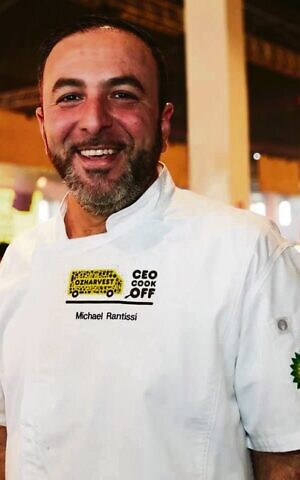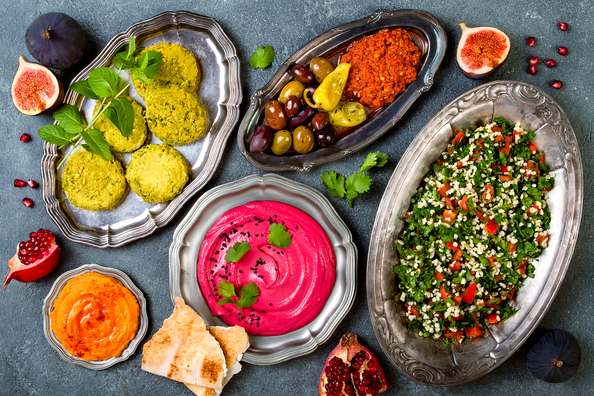Abundance. That’s the key to a quality Israeli breakfast, according to chef Michael Rantissi. And as anyone who has been to Israel knows, an Israeli breakfast overflowing with fresh chopped salad, hummus, egg, labneh and flatbreads, is hard to beat.
“Fresh ingredients, a lot of raw vegetables and a lot of people around,” Rantissi told The AJN.
“For any meal of the day, people make the meal – it’s the energy, the community, the eating together regardless of the food. Food enhances itself when it’s surrounded by people.”
Rantissi grew up in Tel Aviv before “accidentally” making Australia home.
“I came here by mistake,” he said.
“I was just coming to visit a friend and had no intention of living here.”
On his way to Australia he worked in London restaurants and studied at leading cooking schools in New York and Paris. What he learned about food growing up in Israel – his philosophy and his culinary skills – he has brought to his Sydney restaurant, Kepos Street Kitchen. “Israel is very multicultural, so you get exposed to much more food than in other countries around the world,” Rantissi said.
“Because food, after all, is a pure recollection of your memories.”
“You’re not stuck into one cuisine only – you have a blend of different cultural foods together that not many places around the world have.
“We all grew up in households where everything circulates around food – happy moments, sad moments, frustrating moments, in any moment, [it] really always circulates around food. The hospitality at home gives you a bit more love about food than maybe other places around the world.
“I grew up in a family that circulated itself around food. The beautiful part about that was that men were actually involved in a lot of the cooking process, which you don’t see in a lot of other places. The men are part of the food journey and not excluded from it.”
As most would know, Israel is a melting pot of various influences from the Middle East, Europe, North Africa and Asia. European Jews who immigrated during the First Aliyah, brought with them their own culinary traditions, such as the Ashkenazi cuisine. The Sephardi Jews who immigrated from Spain, Portugal and North Africa, brought their own unique blend of Middle Eastern and Mediterranean flavours.

Over the years, Israeli food has evolved as a reflection of the country’s history and cultural diversity. As Israel’s economy grew and the country became more modern, so did its cuisine. The influx of immigrants from all over the world brought new flavours and culinary techniques, leading to a modernisation of Israeli cuisine. Chefs began to experiment with fusion cuisine, blending traditional Middle Eastern ingredients with European and Asian cooking techniques.
All of this means that Israel is now becoming a real culinary destination, with Rantissi describing the evolution of Israeli food over the last decade or so as “mind-blowing”. “It’s becoming one of the newest, biggest destinations,” he said.
“In the past, visiting Israel used to be more around going to see the Holy Land, but today it is an actual food destination. There are more chefs in the last 20 years that have left Israel to study overseas, where they get exposure, and then came back with the training, but still use a lot of the native ingredients mixed with that cultural background. They have made new cuisines that did not exist until 10 or 15 years ago.
“There is this new world of food, with internationally trained Israeli chefs coming back and bringing something new that did not exist before.”
“You’re not stuck into one cuisine only – you have a blend of different cultural foods together that not many places around the world have.”
Israeli chefs are making a name for themselves both locally and overseas, with Jerusalem-born Yotam Ottolenghi probably one of the most accomplished internationally, while Eyal Shani and Meir Adoni are well known for their popular restaurants in Tel Aviv.
Tel Aviv and Jerusalem are Israel’s culinary hot spots and Rantissi says some competition between chefs in those two major cities has further enhanced the culinary scene.
“Tel Aviv and Jerusalem have definitely changed their perspectives around food,” he said.
“Now there is a Jerusalem cuisine that never existed before and that’s fascinating, while Tel Aviv has taken more of the modern approach. It’s a bit like Sydney and Melbourne I would say – the competition between chefs means more chefs want to think out of the box and be a bit more creative to put their stamps in place.”

Michael Rantissi.
Photo: Kepos Street Kitchen
There was a time when there was a scarcity of resources in Israel, which led to a reliance on simple, traditional ingredients. Hummus, falafel and shawarma became some of the most popular dishes, with reliance on native ingredients such as pomegranates, dates, olive oil, tahini and za’atar.
“Growing up in Israel, a lot of the time you could never find brussels sprouts, sugar snaps, peas, fresh mushrooms, asparagus – all of those things were mostly tinned or frozen,” Rantissi said.
“Now when you go to the markets there’s fresh ingredients in abundance. There are a lot of ingredients that you would never have heard about 20 years ago in restaurants, because the desire 20 years ago was mostly duplicating overseas cuisine with average ingredients, not utilising the local produce.”
In the years following the establishment of the State of Israel in 1948, efforts were made to develop a national cuisine that would reflect the country’s diverse cultural heritage. The Israeli government supported culinary initiatives, including the establishment of a national food industry and the promotion of local food production.
In recent years, Israel has seen a rise in the farm-to-table movement, with an emphasis on locally sourced ingredients and sustainable agriculture. Israeli chefs are turning to traditional farming techniques and using locally grown, organic produce to create authentic, fresh flavours.
Today, Israeli cuisine is known for its fresh, healthy ingredients and innovative, modern twists on traditional dishes. At the same time there has also been a resurgence of interest in traditional Middle Eastern cuisine, with a focus on rediscovering forgotten ingredients and techniques.
But while top Israeli chefs continue to push each other to think outside of the box, it’s often the traditional food stands that delight locals and tourists alike. Asked what the major point of difference between Israeli and Australian food culture is, Rantissi said it’s undoubtedly the street food.
“In Australia we are not trained to eat street food because we don’t have it,” he said.
“In Israel there’s shawarma or falafel on the streets made by a person who has been passing this little food stand down from generation to generation. It’s being specialised in these little things that makes the cuisine much more exciting.”
While Israeli cuisine will continue to evolve to reflect the country’s rich and diverse cultural heritage, Rantissi says the best part of a meal will always be the people who are together sharing it.
“We all know you can have an average chicken soup sitting with your family, but it’s the laughter, the memories, the jokes, the fighting – the whole shebang – that makes that your memory,” he said.
“Because food, after all, is a pure recollection of your memories.”


comments